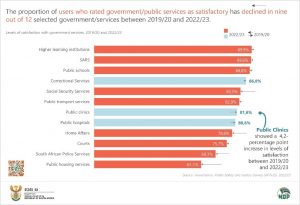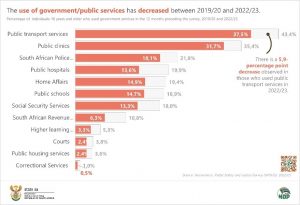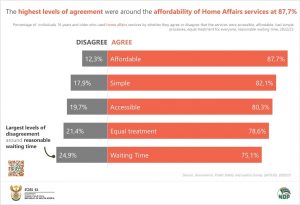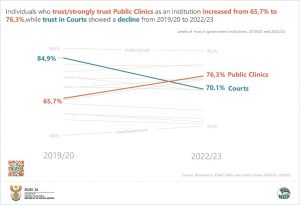Trust in Government, Access to Services, and the Shadow of Corruption
Access to government services is a cornerstone of any well-functioning society. In the realm of governance, the relationship between access to government services, levels of trust in government and public institutions, and individual experiences of corruption significantly impacts the overall well-being of a society. These factors are integral to the effectiveness and legitimacy of a government and its ability to provide public safety and justice. A new report released by Statistics South Africa (Stats SA), Governance, Public Safety and Justice Survey (GPSJS) 2022/23, provides statistics on government effectiveness and performance, trust in government/public institutions and the experience of corruption in South Africa.
According to the report, the use of government/public services declined between 2019/20 and 2022/23. Public transportation services continue to be the most frequently utilised service in 2022/23 while correctional services were the least used government/public services in South Africa by individuals 16 years and older. Services provided by the Department of Correctional Services include incarceration, social reintegration, security and care as well as rehabilitation programmes and interventions to sentenced offenders into communities as law abiding citizens.
During 2019/20, over forty percent (43,4%) of individuals used public transportation services, however, this figure dropped to 37,5% in 2022/23. Similarly, utilisation of public clinics saw a decline, going from 35,4% to 31,7% in the same period. In contrast, services such as courts (2,4%), public housing services (2,4%), and correctional services (0,5%) were among the least utilised in 2022/23.
In Gauteng, 30,4% of people used public transport, with KwaZulu-Natal (17,3%) and Eastern Cape (12,3%) following suit. Conversely, Northern Cape (2,0%) had the lowest percentage of public transport users.
A similar trend was observed when it came to the utilisation of public clinics, where Gauteng had the highest proportion (26,0%), followed by KwaZulu-Natal (19,0%) and Eastern Cape (12,2%). Regarding public school services, the highest proportions were in Gauteng (26,7%), followed by KwaZulu-Natal (18,5%), while Northern Cape had the smallest percentage of users (2,6%).
Sustainable Development Goals (SDG Target 16.6.2) evaluates the percentage of the population satisfied with their last experience with public services, encompassing healthcare, education, and government services. This includes services related to obtaining government-issued identification documents and services associated with civil registration of life events like births, marriages, and deaths. The Handbook on Governance Statistics outlines the assessment of satisfaction with these services by considering four overarching criteria such as: accessibility, affordability, the quality of facilities, and equal treatment for all individuals. Additionally, there are specific criteria unique to each service, such as courtesy and treatment for healthcare services and effective delivery for education services.
The report also indicates that a greater percentage of individuals expressed agreement with the accessibility, affordability, simplicity of the application and document retrieval process, equitable treatment of all individuals, and reasonable waiting times for documents at from department of Home Affairs.
In addition, a larger proportion of individuals concurred that government/public education services were characterised by accessibility, affordability, well-maintained facilities, equitable treatment, and where the quality of teaching was good. Similarly, more individuals affirmed that government/public health services were accessible, affordable, provided well-maintained facilities, ensured equitable treatment, and featured reasonable consultation durations with doctors or nurses.
Satisfaction levels in government and public institutions for the 2022/23 period showed a range of approximately 61% to 90%, in contrast to the 2019/20 period when they spanned from 73% to 91%. Among users, the highest satisfaction rate was found in those who utilised higher learning institutions (89,9%), whereas the lowest level of satisfaction was observed in individuals who were satisfied with public housing services (61,1%). In 2022/23, more than half (57%) of individuals aged 16 years and older residing in metropolitan areas expressed satisfaction or high satisfaction with public housing services. Conversely, 54,1% of those living in non-metropolitan areas were either satisfied or highly satisfied with the police services.

During 2022/23, about 88,3% of individuals aged 16 and above expressed trust or strong trust in public schools, representing a decrease of 1,1 percentage points from 2019/20. Additionally, over two-thirds of the population in the same age group indicated trust or strong trust in South African Social Security Agency (SASSA) (81,9%), South African Revenue Service SARS (81,0%), and public clinic facilities (76,3%) in 2022/23. Notably, trust in courts decreased by 14,8 percentage points between 2019/20 and 2022/23.
Among those who utilised public schools, 87,6% exhibited higher levels of trust compared to non-users (86,3%). Conversely, individuals who used South African Police Services (SAPS) displayed lower trust levels (57,4%) than those who did not use (66,8%). Furthermore, those who used SASSA services reported higher trust levels (83,3%) compared to those who did not use (75,6%). In terms of gender differences, a greater percentage of females (77,5%) trusted SASSA more than males (75,7%), while a higher proportion of males (71,2%) trusted SARS more than females (70,0%).
The significance of combatting corruption is explicitly acknowledged by the 2030 Agenda for Sustainable Development (SDG target 16.5). According to the International Classification of Crime for Statistical Purposes (ICCS, 2016), bribery is defined as: “Engaging in promising, offering, giving, soliciting, or accepting an undue advantage to or from a public official or an individual associated with the private sector, directly or indirectly, with the intent of influencing the performance or non-performance of their official duties.” The GPSJS primarily focuses on experiences of corruption within the public sector.
Traffic officials, followed by police officials and traffic center officials, constituted the highest proportion of officials who solicited bribes from individuals in both 2019/20 and 2022/23. Although the proportions remained relatively stable between the two periods, the absolute numbers revealed an increase in the instances of government officials seeking bribes, except for police officials.
The report includes the use, experience and satisfaction of government services, trust in public institutions and experience of corruption for individuals aged 16 and older. For more information, download the full report here.




